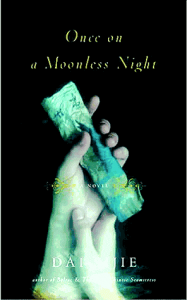A Book Review by Stefanie Field
Once on a Moonless Night by Dai Sijie
 Dai Sijie’s Balzac and the Little Chinese Seamstress was on my wishlist for several months since I have heard such great things about the novel. Before I could cave in to buy it, I had the opportunity to pick up one of his earlier works at a wholesale bookstore in Kuala Lumpur. So I asked myself, “Why not? Why not experience his writing before acquiring his more well-known novel?” Unfortunately, I can’t say the decision to read Once on a Moonless Night was beneficial nor in vain.
Dai Sijie’s Balzac and the Little Chinese Seamstress was on my wishlist for several months since I have heard such great things about the novel. Before I could cave in to buy it, I had the opportunity to pick up one of his earlier works at a wholesale bookstore in Kuala Lumpur. So I asked myself, “Why not? Why not experience his writing before acquiring his more well-known novel?” Unfortunately, I can’t say the decision to read Once on a Moonless Night was beneficial nor in vain.
Once on a Moonless Night is a story within a story, with a connecting side-story. It begins with Puyi, the last emperor of China, and a love for an ancient language. This language would draw the souls of a Frenchman and a Western student of the 1970s who falls in love with Tumchooq – a man named after the very language they seek. Tumchooq disappears after hearing news of his father’s death, leaving the Western student pregnant and in search of the language’s hidden truths.
The writing certainly matches the beauty of the story. Sijie’s multi-layered tale portrays an ethereal feel to the reader, as if this little piece of history is never grounded and is hidden beneath a layer of dreamlike phrases. As beautiful as Sijie’s writing is, it guides the story as a very slow pace. In the beginning of the novel, the reader is thrown into the personal life of emperor Puyi. However, his tale is told in a 20 to 30-page monologue as described by an academic expert. The next chapter is another story connected to the previous by a very thin thread, but also given in another 20-page monologue. By the time the reader is presented to the “outer story” of the novel, a romance between two lovers of the Tumchooq language, there is very little to keep our attention. While the story of a forgotten language is interesting, there seems to be hardly any action between the layers. Each individual tale has its appeal, such as Ma and Tumchooq’s childhood adventure in the Forbidden City and the exhibiton of instruments of torture. Yet, the pace hardly changes. Even when the story abruptly changes to 1st person epistolary diary entries, the pace remains as stagnant as before.
When I first got this book, I was only hesitant due to the vast nature of Chinese history. The nation’s 2,000 years of dynasties have such a rich past and culture that I didn’t think I would comprehend it so easily. And I was right. This books spans from ancient China to the 1970s, and it was difficult for me to keep up with the surrounding situation around each period. In fact, the story explains China’s real and imaginary past, which made the individual layers of the novel more complicated. This is certainly a complex book with such dramatic writing, though beautiful.
Overall, I can’t say I enjoyed the book. It wasn’t my cup of tea, despite my interest in an ancient language. I wanted so badly to unravel its mysteries, but the journey there did not seem adventurous or worth the trouble. However, this book did convince me to borrow his other works from a library before determining to purchase.
In the end, I rated this book one out of five stars.
✭✩✩✩✩
It’s not a book I would generally recommend. But if you are interested in quality writing that keeps you in a prolonged, dream-like state of mind, it would be wise to examine Sijie’s style.
Stefanie Field is a graduate student pursuing a Master’s Degree in International Relations in Bangkok. She is a lover of books and hopes to promote reading culture in Thailand.

